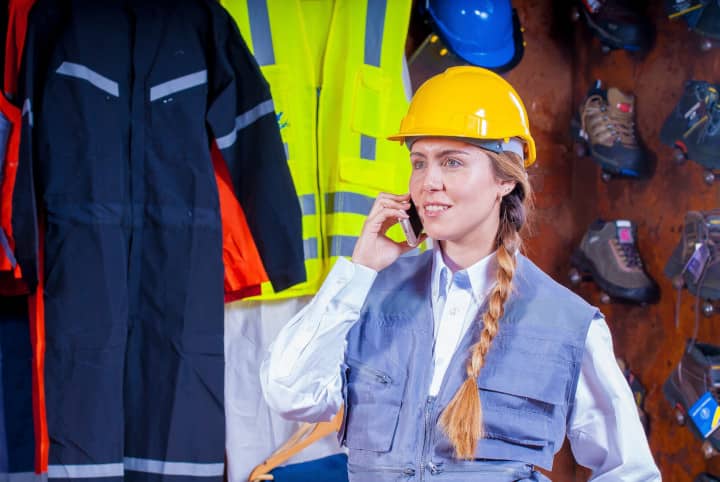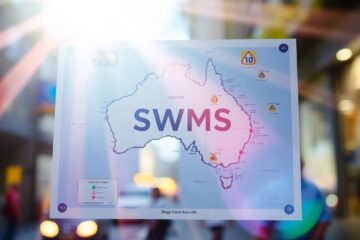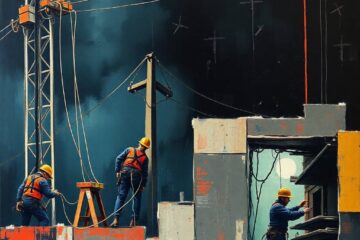Understanding the legal jargon in legislation can be confusing , but it’s important to know what different terms mean in order to comply with the law. In this article, we explain what a ‘person conducting a business or undertaking’ (PCBU) is under Work Health and Safety (WHS) law.
What is a PCBU?
A ‘person conducting a business or undertaking’ (PCBU) is a legal term under WHS laws for individuals, businesses or organisations that are conducting business.
A person who performs work for a PCBU is considered a worker.
Types of PCBUs can include:
- public and private companies
- partners in a partnership
- sole traders and self employed people
- government departments and authorities
- associations if they have one or more employees
- local government councils
- independent schools
- cooperatives
- universities
- not for profit organisations

What is a worker?
Anyone who performs paid work in any capacity for an employer, business or organisation is considered a worker. However the term can also include unpaid workers such as volunteers or work experience students.
You’re considered a worker if you’re an:
- employee
- trainee, apprentice or work experience student
- outworker, contractor or sub contractor
- employee of a contractor or sub contractor
- employee of a labour hire company
It doesn’t matter if the worker is full-time or part-time, as in this context it has nothing to do with the industrial relations terminology for employees etc. A worker can also be someone who carries out work for a business or organisation, even if they’re not paid for it. For example, a volunteer.
People who are self-employed are not considered workers for the purposes of WHS laws. This is because they run their own business and are responsible for their own health and safety.
What are a PCBUs duties?
PCBUs have duties under the WHS Act to ensure, so far as is reasonably practicable, the health and safety of:
- workers while they are at work in the business or undertaking
- visitors to the workplace
- volunteers
- anyone else who may be affected by the work eg. passersby
As a PCBU you must meet your obligations, so far as is reasonably practicable, to ensure the health and safety of workers and other people like visitors and volunteers.
These obligations include:
- safe systems of work
- safe use of plant, structures and substances
- adequate facilities for the welfare of workers
- notification and recording of workplace incidents
- adequate information, training, instruction and supervision
- compliance with requirements under the Work Health and Safety Regulation
- effective systems for monitoring the health of workers and workplace conditions
- a safe work environment
- maintain the premises used for accommodation for workers, if required
You can’t transfer your obligations onto another person or PCBU. That means you can’t hire a contractor and have no responsibility on whether they conduct their work safely.
A PCBU has further obligations if involved in specific kinds of activities like:
- the management and control of workplaces, or fixtures, fittings or plant at workplaces
- the design, manufacture, import or supply of plant, substances or structures
- installation, construction or commissioning of plant or structures
PCBUs must also have meaningful and open consultation about work health and safety with workers, health and safety representatives, and health and safety committees. As a PCBU you must also consult, cooperate and coordinate with other PCBU’s, if you share duties.

What is Primary Duty of Care
As a PCBU you have a primary duty of care to ensure workers and others are not exposed to a risk to their health and safety.
You owe this duty of care when as a PCBU you:
- direct or influence work carried out by a worker
- engage or cause to engage a worker to carry out work (including through sub-contracting)
- have management or control of a workplace
You must also ensure that the health and safety of others is not put at risk from work done as part of the business. This includes visitors to the workplace, people who may be impacted by the work being done (e.g. neighbours), and members of the public.
The primary duty requires PCBUs to do what is reasonably practicable to ensure the health and safety of workers and others. What is reasonably practicable will depend on a number of factors, including:
- thelikelihood of the hazard or risk occurring
- the degree of harm that might result from the hazard or risk
- what is known about ways to eliminate or minimise the hazard or risk
- the availability and suitability of ways to eliminate or minimise the hazard or risk
- after weighing up all these factors, a PCBU must take into account:
- thecost of eliminating or minimising the hazard or risk
- the current state of knowledge about the hazard or risk and any ways of eliminating or minimising the hazard or risk
- the nature and extent of the exposure to the hazard or risk
- the degree of control a PCBU has over the workplace, systems of work and workers.
This means that aPCBU must do everything that is reasonably practicable to eliminate or minimise risks to health and safety. It is not enough for a PCBU to simply take steps that are less costly or easier to implement, if there are other options available that would better control the risk.
For example, if a worker is exposed to a risk of being hit bya forklift, a PCBU may control the risk by providing the worker with a helmet. However, this does not eliminate the risk of being hit by a forklift. A more effective way to control the risk would be to eliminate or minimise the exposure of workers to forklifts by implementing traffic management controls such as separating pedestrians and vehicles usingbarriers or signs.

What does consultation mean?
Consultation in this context means to exchange information about work health and safety, to identify issues and resolve them. It should be a two-way process with the aim of achieving agreement. The focus should be on finding ways to improve work health and safety in the workplace.
Consultation occurs when a PCBU or worker seeks the views of others, and takes those views into account when making decisions about work health and safety.
Workers should be given a reasonable opportunity to express their views about matters that may affect their health, safety and welfare at work. Workers should also be provided with sufficient information about the matter to enable them to participate effectively in consultation.
Effective consultation requires timely communication between the PCBU or worker and the person being consulted. All parties should be able to freely express their views without fear of reprisal, and have those views genuinely considered in any decision-making process.
Simple and common ways to consult with workers include safe work method statements and toolbox talks.
Health and safety representatives (HSRs)
Under the WHS Act, PCBUs must consult with health and safety representatives (HSRs) about matters that may affect the healthand safety of workers at the workplace.
An HSR is elected by members of a work group and appointed for a 12-month term. HSRs have specific statutory powers, including the ability to issue provisional improvement notices (PINs) in certain circumstances.
HSRs also play an important role in promoting and improving work health and safety withintheir work group. For example, they can monitor the health and safety of workers in their work group and act as a point of contact between workers and management on health and safety issues.
How can Safe-R Outcomes help your business?
Our Professional subscriptions contain many essential documents including:
- WHS Management Plans / Safety Manuals
- SWMS (if the job entails high risk tasks)
- a range of SOPs, Registers, Toolbox Talks, Checklists and Policies
These can all be downloaded and are not blank templates, so can be used immediately.
We also provide Induction training to help you on-board new employees and contractors.
As you can see it is all done for you so it makes it nice and simple. You can find out more on the Industries and Professions page.
If you’re concerned about the time commitment and knowledge required to implement the correct documents, procedures and training for forklift safety, Safe-R Outcomes can help. We strive to reduce the time and cost for businesses to implement their legally necessary safety requirements.


